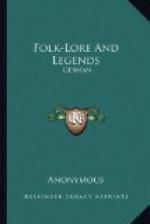Coinnach Oer, which means Dun Kenneth, was a celebrated man in his generation. He has been called the Isaiah of the North. The prophecies of this man are very frequently alluded to and quoted in various parts of the Highlands; although little is known of the man himself, except in Ross-shire. He was a small farmer in Strathpeffer, near Dingwall, and for many years of his life neither exhibited any talents, nor claimed any intelligence above his fellows. The manner in which he obtained the prophetic gift was told by himself in the following manner:—
As he was one day at work in the hill casting (digging) peats, he heard a voice which seemed to call to him out of the air. It commanded him to dig under a little green knoll which was near, and to gather up the small white stones which he would discover beneath the turf. The voice informed him, at the same time, that while he kept these stones in his possession, he should be endued with the power of supernatural foreknowledge.
Kenneth, though greatly alarmed at this aerial conversation, followed the directions of his invisible instructor, and turning up the turf on the hillock, in a little time discovered the talismans. From that day forward, the mind of Kenneth was illuminated by gleams of unearthly light; and he made many predictions, of which the credulity of the people, and the coincidence of accident, often supplied confirmation; and he certainly became the most notable of the Highland prophets. The most remarkable and well known of his vaticinations is the following:—“Whenever a M’Lean with long hands, a Fraser with a black spot on his face, a M’Gregor with a black knee, and a club-footed M’Leod of Raga, shall have existed; whenever there shall have been successively three M’Donalds of the name of John, and three M’Kinnons of the same Christian name,—oppressors will appear in the country, and the people will change their own land for a strange one.” All these personages have appeared since; and it is the common opinion of the peasantry, that the consummation of the prophecy was fulfilled, when the exaction of the exorbitant rents reduced the Highlanders to poverty, and the introduction of the sheep banished the people to America.
Whatever might have been the gift of Kenneth Oer, he does not appear to have used it with an extraordinary degree of discretion; and the last time he exercised it, he was very near paying dear for his divination.
On this occasion he happened to be at some high festival of the M’Kenzies at Castle Braan. One of the guests was so exhilarated by the scene of gaiety, that he could not forbear an eulogium on the gallantry of the feast, and the nobleness of the guests. Kenneth, it appears, had no regard for the M’Kenzies, and was so provoked by this sally in their praise, that he not only broke out into a severe satire against their whole race, but gave vent to the prophetic denunciation of wrath and confusion upon their posterity.




